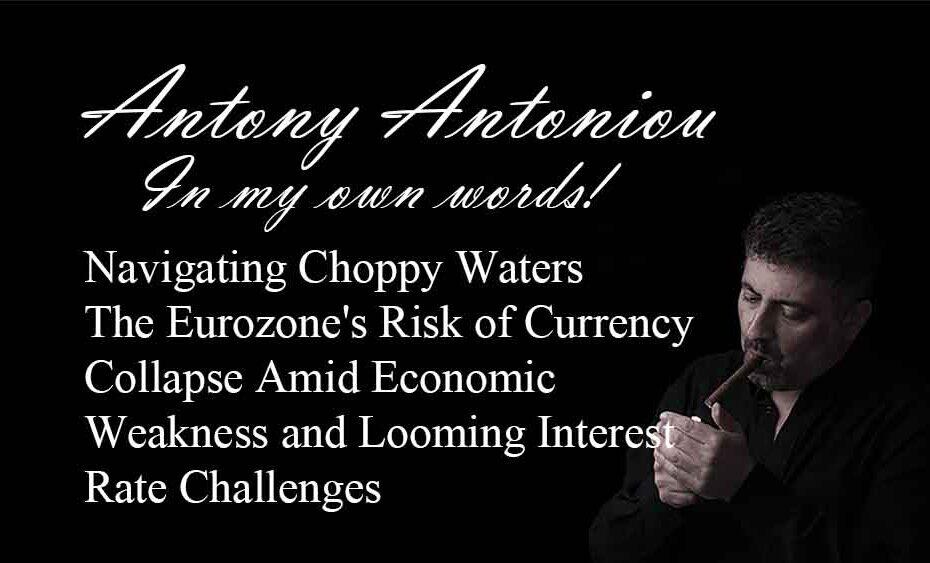Navigating Choppy Waters – The Eurozone’s Risk of Currency Collapse Amid Economic Weakness and Looming Interest Rate Challenges
The European Central Bank Grapples with a Dire Choice: Defend the Euro or Face its Collapse
In the intricate tapestry of global economics, currencies often find themselves at the mercy of a delicate equilibrium between policy responses, economic indicators, and international dynamics. Presently, the Eurozone stands at the brink of a potential currency collapse. A faltering economy, coupled with surging inflation and the imminent threat of an interest rate time bomb, have cast a shadow of uncertainty over the euro’s future. The European Central Bank (ECB) finds itself at a crossroads, compelled to make a pivotal decision that could redefine the trajectory of the euro.
The Warning Signs
Bob Lyddon, a perceptive tax consultant based in the UK, has sounded a clarion call, drawing attention to the imminent threats that loom over the euro’s stability. Commerzbank, a prominent Frankfurt-based institution, has concurred with Lyddon’s assessment, underscoring the mounting pressures the euro faces due to developments across the Atlantic. As the euro teeters at €1.10, with a precarious 0.86 against the pound, it becomes evident that the challenges confronting the Eurozone are both multifaceted and pressing.
Depleted Arsenal: ECB’s Dilemma
Lyddon’s analysis lays bare the ECB’s depletion of policy tools to counter the Eurozone’s economic decline. As the ECB scales back its bond-buying and lending programs, interest rates rise, and the money supply dwindles. This policy quagmire leaves the ECB with an unenviable choice: either risk unsettling the currency by hiking interest rates or maintain the status quo and potentially witness the euro’s downfall.
Dance with Inflation: Eurozone’s Balancing Act
At the heart of this conundrum lies the Eurozone’s grappling with inflation. Much like the Bank of England’s delayed response to inflation was overshadowed by the Federal Reserve’s proactive stance, the ECB faces a similar predicament. The Eurozone’s failure to address inflation in a timely manner has propelled the necessity of mirroring the Federal Reserve’s actions to avert a currency crisis. In essence, the Eurozone has transformed into a “tracker fund,” mirroring the Fed’s steps to safeguard its own stability.
Vulnerabilities Amplified: Geopolitical Realities
The Eurozone’s vulnerabilities are amplified by its reliance on exports to China, a nation grappling with its own set of economic challenges. As China’s growth falters and geopolitical tensions simmer, Eurozone exports to this pivotal market are under threat. Furthermore, the Eurozone’s proximity to Ukraine adds another layer of uncertainty, encompassing energy supplies and the specter of potential conflict spillover.
Pressures Mount: Eurozone’s Contrasting Trajectory
Commerzbank’s assessment sheds light on the Eurozone’s vulnerability. Unlike the United States, where the economy displays resilience, the Eurozone’s economic vigor is waning, exerting downward pressure on the euro. This downward trajectory is likely to persist unless the Eurozone can reverse its economic course.
A Pivotal Decision Looms
The ECB’s impending decision on interest rates, slated for September 14, stands as a pivotal moment. This decision holds the power to dramatically alter the euro’s course. With inflation still well above the ECB’s two percent target and the shadow of a currency collapse looming, ECB President Christine Lagarde shoulders the daunting responsibility of steering the Eurozone through these tumultuous waters.
In the Maelstrom of Global Economics
As the global economic landscape undergoes dynamic shifts, the challenges facing the Eurozone epitomize the intricate interplay between policy, economy, and international dynamics. The fate of the euro hangs precariously in the balance, watched closely by observers worldwide. The upcoming weeks will bear witness to the ECB’s intricate dance between defending the euro’s stability and averting its potential downfall. The decisions undertaken in this critical phase will not only shape the Eurozone’s economic future but also weave a thread into the broader tapestry of global financial stability.
Conclusion
In a world where economic stability is a delicate interplay of policies, indicators, and global forces, the Eurozone finds itself at a crossroads of significant proportions. The prospect of a currency collapse looms large as a weakened economy grapples with mounting inflation and the imminent challenge of interest rate adjustments. This complex scenario places the European Central Bank (ECB) in a position of immense responsibility, requiring a careful balancing act to safeguard the euro’s future.
The warnings from experts like Bob Lyddon and the resonance found in Commerzbank’s concerns paint a vivid picture of the Eurozone’s vulnerabilities. The currency’s value teeters as economic pressures mount, and the ECB faces a dilemma: navigate a challenging policy landscape or risk the currency’s downfall. The Eurozone’s dance with inflation, its dependence on exports to an uncertain China, and the geopolitical tensions it faces, all add layers of complexity to the situation.
As September approaches, the ECB’s looming decision on interest rates will be a defining moment. The outcomes will ripple through the Eurozone and resonate on the global stage. The journey ahead requires the ECB, under the leadership of Christine Lagarde, to make calculated choices to preserve stability and avert crisis. The echoes of the decision will reverberate not only within the Eurozone’s economic trajectory but also across the broader tapestry of international finance.
In the grand mosaic of the global economy, the Eurozone’s predicament serves as a vivid reminder of the intricate dance between policy responses, economic realities, and geopolitical dynamics. The fate of the euro is no longer just a regional concern; it’s a matter of international significance. As observers and stakeholders watch intently, the ECB’s decisions in the coming weeks will set the tone for what lies ahead, defining not only the Eurozone’s economic destiny but also contributing to shaping the contours of the global financial landscape. In these times of uncertainty, one thing is clear: the Eurozone’s journey ahead will require resilience, adaptability, and strategic acumen to navigate through the turbulence and emerge stronger on the other side.

